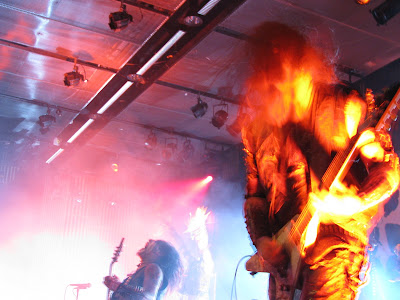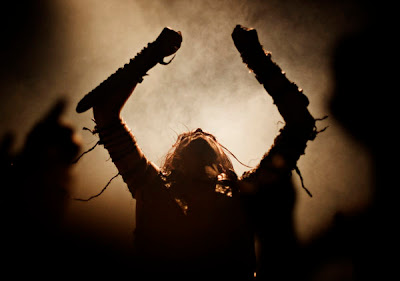>
When writing reviews I always tend to write way too lenghty. I wrote a review for the Watain/Grand Magus/Die Hard-gig for Sweden Rock Magazine, and of course the editors had to cut it in half. With their kind permission I hereby publish the whole review uncut.
But first: The latest issue of Sweden Rock Magazine features a great interview with Arioch of Funeral Mist, revealing that Funeral Mist is releasing a new album in February. This is without a doubt the best thing that will happen to black metal in the year of 2009!
I actually learned about this at the night of the Watain gig – about two months ago – and I promised not to tell. It’s been hard keeping that promise, but I did. Now, the arrival of Maranatha should soon be upon us. Blessed be the Lord God Almighty…

Until then, here’s the gig review in all its glory.
In Swedish of course…

 Världens enda sanna black metal-band just nu? Det beror givetvis på hur man ser på saken, men att Watain, som denna kväll firar tio år som band, står relativt ohotade på tronen är det nog få som bestrider. Sällan har väl ett band varit så genuint hängivet sina ideal som dessa Uppsalas mest beundrade och föraktade. Vid merchandiseborden finns en mindre utställning att skåda där gamla fotografier och flyers samsas om utrymmet på väggarna. Här finns även en lista över bandets alla framträdanden och den visar tydligt hur hänsynslöst de tre bista herrarna har marscherat från ingenstans till överallt på kort tid. Att mörkret sprider sig så snabbt är måhända en markör för nutidens tillstånd, samtidigt som det naturligtvis visar upp en ytterst målmedveten och enträgen grupp människor.
Världens enda sanna black metal-band just nu? Det beror givetvis på hur man ser på saken, men att Watain, som denna kväll firar tio år som band, står relativt ohotade på tronen är det nog få som bestrider. Sällan har väl ett band varit så genuint hängivet sina ideal som dessa Uppsalas mest beundrade och föraktade. Vid merchandiseborden finns en mindre utställning att skåda där gamla fotografier och flyers samsas om utrymmet på väggarna. Här finns även en lista över bandets alla framträdanden och den visar tydligt hur hänsynslöst de tre bista herrarna har marscherat från ingenstans till överallt på kort tid. Att mörkret sprider sig så snabbt är måhända en markör för nutidens tillstånd, samtidigt som det naturligtvis visar upp en ytterst målmedveten och enträgen grupp människor.
Die Hard, thrashbandet som väl får ses som en enda lång hyllningskör till Venom, öppnar denna regnmörka kväll på Uppsala Konsert & Kongress. Här återfinns Watains trummis Håkan Jonsson och han är den stora behållningen under detta gig. Helikopterbangande batterister är bra för Sverige.
Och på tal om scenen: Die Hard har som trio oerhört svårt att fylla den. Det känns ganska stelt, vilket ju blir helt fel för ett band av den här typen, där det egentligen handlar om att headbanga, supa och leva djävul. Hade de lirat på Kafé 44 med fullständiga rättigheter klockan elva på kvällen en lönehelg i augusti inför en packad publik hade de tveklöst varit minst dubbelt så bra. De förlorar mycket på den stora scenen, på att spela först och på att få tycks vara bekanta med låtarna. Det är således inte bandets fel att det blir aningen tungrott. De är som bäst i ”Evil Always Returns” och Venom-covern ”Die Hard”, låten som förmodligen är grunden till bandets existens. Den fylleheadbangande publiken har endera inte hittat till lokalen i tid eller inte fått i sig tillräckligt med alkohol och därför blir giget därefter. (4)
Die Hard har även problem med att fylla ut tomrummet som bildas när det vankas gitarrsolo, något som efterföljande Grand Magus inte drabbas av, trots att även de är en trio. Mats Fox Skinners basspel och Sebastian Sippolas trummor mullrar med sådan kraft att Janne Christofferson fritt kan ägna sig åt soloutflykter utan att ljudbilden förlorar trycket. Med ”Iron Will” som ett av årets absolut främsta hårdrocksalbum i ryggen (mer metal än så kan det knappast bli, för att använda ett slitet uttryck) är det fritt fram för Grand Magus att bara gå upp och härska. Jag blir genuint glad och stärkt av deras musik, och det känns som de vidrör vid någon märklig nordisk nerv som tycks löpa genom allt de gör – utan att det känns krystat eller löjligt för fem öre. Här finns en tanke och en hängivelse, även om det i grunden är ren jävla hårdrock det handlar om.
Öppningen med ”Like the Oar Strikes the Water” är grymt bra och när man kommit in i rätt sinnesstämning blir det bara bättre och bättre. Övergången från fantastiska, klassiskt sjuttiotalsmörka och slöa ”Baptised in Fire” till den mycket manliga energiurladdningen ”Kingslayer” är genial och Janne sjunger om möjligt bättre än någonsin. I slutet av ”The Shadow Knows” når han klimax och tankar på Rockbox (radioprogrammet som lade grunden för mitt musikintresse) far genom skallen och jag flinar brett. Det här är tveklöst det bästa jag sett med Grand Magus hittills. Pär Fontander hade dyrkat. (8)
Under hela kvällen har skivor från kvällens födelsedagsbarn spisats flitigt i högtalarna. Tjugo minuter innan de går på scenen ljuder ”Sworn To the Dark” inne i lokalen och ett gäng ynglingar stämmer upp i allsång i refrängerna. De kan inte vänta längre. Peppen är total.
På scen råder febril aktivitet, även om det i stort sett är en enda man som bygger upp hela scendekoren. För faktum är att musiken redan finns där, den är ett med Watain och flyter automagiskt utan problem. Således kan de lägga minst lika mycket kraft på det visuella och skapa det helhetsintryck som skiljer Watain från alla andra band i genren. Och skulle den oheliga treenigheten någon gång presentera en fjärde medlem torde det vara denna Johan Frölund, Watains privata scenograf, som med extrem noggrannhet placerar kranium, stearinljus, uppochnervända kors, skelettdelar, kedjor, allehanda metallkonstruktioner, en nattvardskalk, svarta tygskynken och spetsade djurhuvuden på scenen – givetvis symmetriskt korrekt placerat och enligt symbolikens alla regler. Djävulen finns i detaljerna.
Värt att notera är att Watain för kvällen begagnar sig av tre egna säkerhetsvakter vid scenen, varav en är Sweden Rocks egen black metal-filosof Niklas Göransson och en annan Marcus Tena från sorgligt förbisedda Triumphator. Väktarna hade enligt uppgift förhållningsorder om att slå ner folk och dricka ”Sprite”. Fullkomligt lysande.
”Legions of the Black Light” inleder och följs tätt av ”Devil’s Blood”. Intensitet och fokus går inte att ta miste på och där jag står, längst fram vid sidan av scenen, låter det synnerligen brutalt och mäktigt. Folk ute i publiken klagar senare på grumligt ljud och att gitarrslingorna inte hördes, men det gick åtminstone mig förbi.
Det har utlovats en annorlunda setlist kvällen till ära och vi bjuds på ”Satan’s Hunger”, ”Black Salvation” och ”Rabid Death’s Curse” innan vad som enligt mig är ett av Watains starkaste kort, ”I Am the Earth” exploderar på scenen. Mest nöjd är jag dock med ”The Serpent’s Chalice”, den känslomässigt mest innehållsrika låten från gruppens tredje album ”Sworn to the Dark”, och alltid lika stenhårda ”The Limb Crucifix”. När Erik av misstag går med ansiktet före rakt in i en lie av stål som utgör scendekorationen tycks det bara spä på aggressionen och energin. Pelle Forsberg dominerar sin flank. Set Teitan är sammanbitet iskall i sin totala närvaro. Alvaro vandrar runt likt en förvriden Gene Simmons. Det är fullt jävla ställ, det brinner, stinker och ryker och det är tveklöst en grym konsert vi bevittnar. Niklas Göransson bedyrar senare att det var en av de bästa Watain-konserter han bevittnat, och den mannen har sett en hel del av dessa.
Men i ”Casus Luciferi” händer det. Precis när jag antar att låten tar slut så utlöses brandlarmet! All elektricitet kopplas från, allting tystnar och lokalen lyses upp samtidigt som en röst envetet repeterar ”Please evacuate the building – a fire has been reported”. No shit, Sherlock. Det här bandet begagnar sig nämligen av pyroteknik.
Bandet står lyckligtvis inte handfallna kvar på scenen utan marscherar raskt utan att blinka ner från densamma. Trots det är detta för många definitionen av antiklimax. Jag påminns om Dissections inledning på comebackspelningen där ljudet strulade i första låten, och Mayhems gamla signum ”The curse is eternal” ekar åter i bakhuvudet. Varför i helvete… Men det är bara att acceptera att de ansvariga för lokalen har gjort bort sig. Efter några minuters förvirring går Erik upp på scenen och avslutar konserten med ett magiskt eldtrick och det hela är över. Vi går miste om ”Stellarvore”, ”On Horns Impaled” och ”Storm of the Antichrist”, tre låtar som hade varit en perfekt avslutning. Men samtidigt kan jag inte låta bli att fascineras av det oväntade, det oplanerade som så bryskt kan slita saker itu. Jag gillar det och tror nog att även Watain kan gå i god för styrkan i det kaos som råder.
När folk slutligen börjar lämna lokalen dyker tre förvirrade rökdykare upp. ”Det brinner bara i några kastruller”, säger en svettig besökare och syftar på den eld som flammar i metallkärlen på scenen.
Det är lite synd att Watains gig kommer att förknippas med den abrupta avslutningen, för det har varit en riktigt bra konsert. Däremot tycker jag att valet av lokal kanske inte var det allra bästa. Bandet har tveklöst tvingats kompromissa. Jag var beredd på blod, eld och död, men den stora scenen och det flashiga hak som Uppsala Kongress & Konsert är tillåter inte detta i sin mest fulländade form, och utgör således inte mitt idealställe för black metal av Watains kaliber. Dessutom gör den höga scenen och kravallstaketet att det blir för distanserat.
Idealupplevelsen torde lyda som följer: fös in en hängiven publik likt boskap i en alltför liten lokal som redan då orsakar osäkerhet och rädsla, lås dörren, dränk scenen och väggar med ruttet grisblod, låt även blod droppa konstant från taket, bränn kadaver, låt musiken strömma från alla håll och kanter, ha högt i tak så eldkastare och dylikt kan användas utan problem, skippa kravallstaketet, placera Watain på en låg, mindre scen och låt så helvetet braka loss. Då kan vi snacka om ”no return”. I ett sådant skede delar jag tveklöst ut högsta möjliga betyg.
Watains spelning i Linköping den 25 februari 2006 var oerhört nära detta ideal. Folk flydde mot toaletterna för att spy redan innan bandet hade äntrat scenen. Det är så det ska vara.
Nåväl. Med facit i hand och med tanke på förutsättningarna blir betyget denna gång ändå en klockren åtta. Det som var, det var jävligt bra. (8)
 In case you ever wondered what these DJ:s actually do when turning them knobs back and forth, here’s a video that might give you an idea of what’s going on. This is live beatmaking with the KORG Electribe MX.
In case you ever wondered what these DJ:s actually do when turning them knobs back and forth, here’s a video that might give you an idea of what’s going on. This is live beatmaking with the KORG Electribe MX.



















